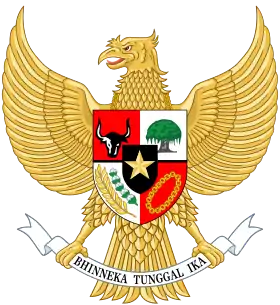Ministry of State Secretariat (Indonesia)
The Ministry of State Secretariat of the Republic of Indonesia (Indonesian: Kementerian Sekretariat Negara Republik Indonesia) is a government ministry responsible for providing technical, administrative, and analytical support to the President and Vice President in the exercise of their state powers. The current minister of state secretariat is Pratikno, who previously served as Rector of Gadjah Mada University in Yogyakarta.[1]
| Kementerian Sekretariat Negara | |
 Logo of the Ministry of State Secretariat | |
| Agency overview | |
|---|---|
| Formed | 19 August 1945 |
| Jurisdiction | Government of Indonesia |
| Headquarters | No. 17-18 Veteran St. Central Jakarta 10110 Jakarta, Indonesia |
| Minister responsible |
|
| Website | www |
Duties
The State Secretariat is responsible for providing technical, administrative, and analytical support to the President and Vice President of Indonesia, the details are which as follow:
- Providing technical and administrative support for the household, protocols, press, and media affairs of the president;
- Providing technical and administrative support for the household and protocols of the vice president, as well as vice-presidential analytical support to assist the president;
- Providing technical and administrative support of the president as the commander-in-chief of the Indonesian National Armed Forces concerning the promotion and dismissal of military officers, awarding of titles and honors, and the provisions on security coordination for the president, vice president, their households, and visiting foreign head of states/head of governments;
- Providing technical, administrative, and analytical support concerning drafting of legislations, resolutions of legal issues involving the president and vice president, as well as drafting of presidential decisions for clemency, amnesty, abolition of punishments, legal rehabilitation, remission of life imprisonment conviction into regular imprisonment, citizenships, extraditions, and Indonesian membership in international organizations;
- Providing technical, administrative, and analytical support concerning inter-institutional relations between state institutions, non-structural institutions, regional institutions, public organizations, political organizations, and managing public complaints to the president, vice president, or the ministers;
- Providing technical, administrative, and analytical support concerning the promotions, dismissals, and the retirements of state officials, government officials, other officials, and the civil servants;
- Fostering, managing, and developing the bureaucracy, its organization, administration, and reforms, within the Ministry;
- Coordinating the duties, fostering, and administrative support within the Ministry, as well as the management of presidential archives, facilities for former presidents and vice presidents, and other administrative support for the presidential medical team;
- Managing state property/wealth within the jurisdiction of the Ministry;
- Coordinating and facilitating technical cooperation between the Government of Indonesia and various actors of development, as well as the administrative management of official overseas visits;
- Supervision over duties and responsibilities within the Ministry; and
- Executing other functions and duties as ordered by the president and vice president, or by law.
Organization
Based on the latest regulations, which is the Presidential Regulation No. 31/2020 on the Ministry of State Secretariat and the State Secretariat Ministerial Regulation No. 5/2020 on the Organization of the State Secretariat, the ministry organizational structure is as follows:[2]
Leadership:
- State Secretary Minister (Indonesian: Menteri Sekretaris Negara), which headed the entire ministry;
Secretariats:
- Ministerial Secretariat (Indonesian: Sekretariat Kementerian), headed by a Ministerial Secretary, tasked with providing general administrative support of the entire ministry. The secretariat is subdivided into:
- Bureau on Public Relations;
- Bureau on Information, Data, and Technology;
- Bureau on International Technical Cooperation;
- Bureau on Finance;
- Bureau on Planning; and
- Bureau on General Affairs.
- Presidential Secretariat (Indonesian: Sekretariat Presiden), headed by a Chief of Presidential Secretariat, tasked with providing technical and administrative support for the president's household, protocols, press, and media, including the management of the Presidential Palaces and the presidential medical team. The presidential secretariat is subdivided into:
- Deputy on Administrative Affairs and Palace Management; and
- Deputy on Protocols, Press, and Media.
- Vice-presidential Secretariat (Indonesian: Sekretariat Wakil Presiden), headed by a Chief of Vice-presidential Secretariat, tasked with providing technical and administrative support for the vice president's household, protocols, as well as providing governance support and policy analysis. The vice-presidential secretariat is subdivided into:
- Deputy on the Support for Economic Development Policies and Competitiveness Promotion;
- Deputy on the Support for Human Development Policies and Equitable Development;
- Deputy on the Support for Governance Policies and National Outlook; and
- Deputy on Administrative Affairs.
- Presidential Military Secretariat (Indonesian: Sekretariat Militer Presiden), headed by a Presidential Military Secretary, tasked with providing technical and administrative support for the president's role as commander-in-chief of the armed forces, especially in regards to appointments and dismissals of officers of the national armed force and the national police force, bestowing state awards, titles, and honors, as well as security coordination of the president, vice president, their household, or visiting foreign head of state/head of government. The Presidential Military Secretariat is subdivided into:
- Bureau on Armed Forces and Police Force Personnels;
- Bureau on Security Details;
- Bureau on Titles and Honors; and
- Bureau on General Affairs.
Deputy Secretaries:
- Deputy Secretary on Legislations and Legal Administration, tasked with providing technical, administrative, and analysis support on legislation drafting, litigations, and other legal issues involving presidential and vice-presidential office, drafting of presidential decisions on clemency, amnesty, abolition of criminal punishments, rehabilitation, remission of criminal punishments, as well as issues on citizenships, extraditions, and Indonesian membership in international organizations. The deputy secretary is assisted by:
- Assistant Deputy Secretary on Legal Administration;
- Assistant Deputy Secretary on Human Development and Cultural Affairs;
- Assistant Deputy Secretary on Home Governance and Regional Autonomy; and
- Assistant Deputy Secretary on Political, Legal, and Security Affairs.
- Deputy Secretary on Institutional and Public Relations, tasked with providing technical, administrative, and analysis support on maintenance of relations with other state institutions, non-structural institutions, regional institutions, public organizations, and political organizations. The deputy secretary is assisted by:
- Assistant Deputy Secretary on State and Government Institutional Relations; and
- Assistant Deputy Secretary on Non-government Institutional Relations.
- Deputy Secretary on State Apparatus Administration tasked with providing technical, administrative, and analysis support on appointments, dismissals, and retirements of state officials, government officials, other officials, and civil servants, as well as bureaucratic reform and internal legal advocacy and litigations of the ministry. The deputy secretary is assisted by:
- Bureau on State Officials Administration;
- Bureau on Bureaucratic Organization, Administration, Legal Affairs, and Reform; and
- Bureau on Human Resources.
Advisors to the Minister:
- Advisor to the Minister on Politics, Defense, and Security, tasked with providing the minister with analysis and recommendations on political, defense, and security issues;
- Advisor to the Minister on Economic, Maritime, Human Development, and Culture, tasked with providing the minister with analysis and recommendations on economic, maritime, human development, and cultural issues;
- Advisor to the Minister on Legal, Human Rights, and Governance, tasked with providing the minister with analysis and recommendations on legal, human rights, and governance issues;
- Advisor to the Minister on State Apparatus and Bureaucratic Reform, tasked with providing the minister with analysis and recommendations on state apparatus and bureaucratic reform issues; and
- Advisor to the Minister on Political Communication and Public Relations, tasked with providing the minister with analysis and recommendations on political communication and public relations issues;
Inspectorate
- Inspectorate, tasked with providing internal monitoring within the ministry;
Centers
- Center for Apparatus Competence Development (Indonesian: Pusat Pengembangan Kompetensi Aparatur Sipil Negara), tasked with educating and training State Secretariat personnels;
- Gelora Bung Karno Sports Complex Managing Center (Indonesian: Pusat Pengelolaan Komplek Gelanggang Olahraga Bung Karno), tasked with managing Gelora Bung Karno Sports Complex in Senayan, Jakarta; and
- Kemayoran Complex Managing Center (Indonesian: Pusat Pengelolaan Komplek Kemayoran), tasked with managing state assets in Kemayoran, Jakarta.
Special Staffs to the Minister
- Special Staff to the Minister on Legal Affairs
- Special Staff to the Minister on Political and Institutional Communications
- Special Staff to the Minister on Institutional and Human Resources Transformation
- Special Staff to the Minister on Social and Cultural Affairs
List of ministers
| Name | Term length | Cabinet | Notes | ||
|---|---|---|---|---|---|
| Term start | Term End | ||||
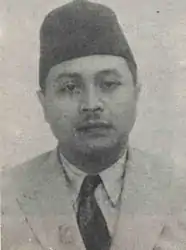 |
Abdul Gaffar Pringgodigdo | 19 August 1945 | 14 November 1945 | Presidential Cabinet | |
| State secretariat function were exercised by the Prime Minister's Office during liberal democracy period in Indonesia. | |||||
| Mohammad Ichsan | 23 August 1962 | 25 July 1966 |
| ||
| Abdul Wahab Soerjoadiningrat | 23 August 1962 | 13 December 1963 | |||
| State secretariat function were dormant during acting presidency of Soeharto. | |||||
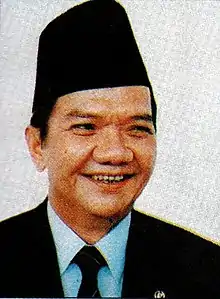 |
Alamsyah Ratu Perwiranegara | 9 February 1968 | 8 April 1972 |
| |
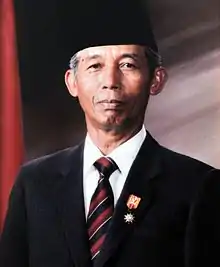 |
Sudharmono | 8 April 1972 | 21 March 1988 |
| |
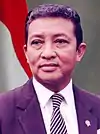 |
Murdiono | 21 March 1988 | 14 March 1998 | ||
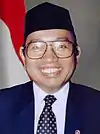 |
Saadilah Mursyid | 14 March 1998 | 21 May 1998 | Seventh Development Cabinet | |
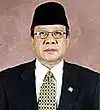 |
Akbar Tanjung | 23 May 1998 | 10 May 1999 | Development Reform Cabinet |
|
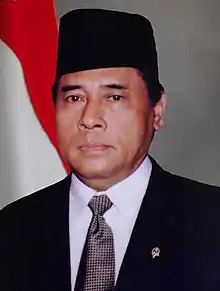 |
Muladi (ad interim) | 10 May 1999 | 20 October 1999 | ||
| Alirahman | 29 October 1999 | 15 February 2000 | National Unity Cabinet |
| |
| Bondan Gunawan | 15 February 2000 | 29 May 2000 | |||
| Djohan Effendi | 29 May 2000 | 21 June 2001 | |||
| Muhammad Maftuh Basyuni | 21 June 2001 | 23 July 2001 | |||
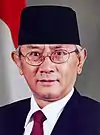 |
Bambang Kesowo | 10 August 2001 | 20 October 2004 | Mutual Assistance Cabinet |
|
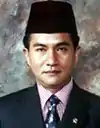 |
Yusril Ihza Mahendra[7] | 21 October 2004 | 9 May 2007 | First United Indonesia Cabinet |
|
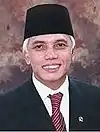 |
Hatta Rajasa | 9 May 2007 | 20 October 2009 | ||
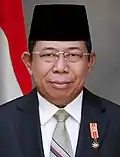 |
Sudi Silalahi | 22 October 2009 | 20 October 2014 | Second United Indonesia Cabinet | |
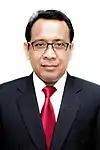 |
Pratikno | 27 October 2014 | incumbent | ||
See also
References
- "Tasks and Functions". Ministry of State Secretariat of the Republic of Indonesia. Ministry of State Secretariat of the Republic of Indonesia. Retrieved 29 November 2015.
- "PERPRES No. 31 Tahun 2020 tentang Kementerian Sekretariat Negara [JDIH BPK RI]". peraturan.bpk.go.id. Retrieved 2022-02-19.
- Susanto, Ready. Mari Mengenal Kabinet Indonesia. p. 62.
- Susanto, Ready (20 January 2022). Mari Mengenal Kabinet Indonesia (in Indonesian). p. 68.
- Presidential Decision No. 194/1965. https://jdih.setkab.go.id/PUUdoc/13581/Keppres1941965.pdf
- Gaus, Ahmad (2009). Sang Pelintas Batas: Biografi Djohan Effendi (in Indonesian). Jakarta: Kompas. p. 197. ISBN 9786029556612.
- "Yusril: Mensesneg Tidak Punya Program Kerja". detiknews (in Indonesian). Retrieved 2022-02-19.
